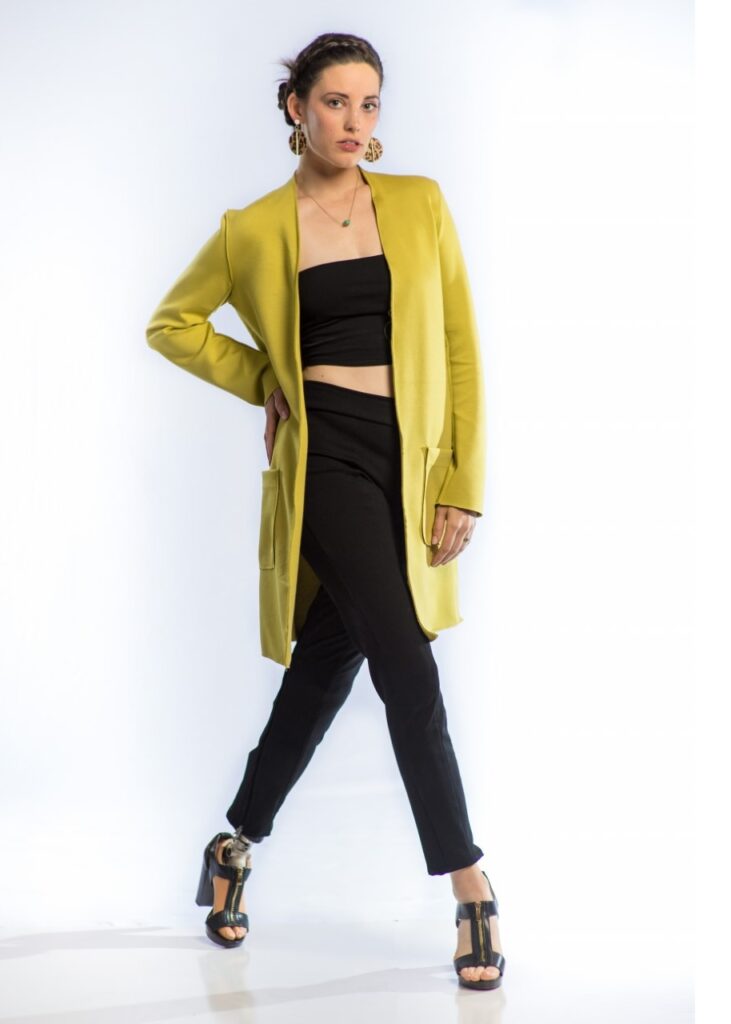
Hair/makeup: Caitlin Conner.
A couple of days before Uniteable Inclusive Fashion officially launched last week, we asked founder and CEO Brittany Burke what sets her brand apart from mass-market competitors such as Tommy Adaptive or Nike FlyEase.
“We’re very community based,” she says. “We think it’s really important to gain the trust of the adaptive community and show them our brand really represents them. With us, there is no brand without the adaptive community.”
That’s it in a nutshell. While profits are important and necessary to Burke, people are her mission. She defines Uniteable as an advocate for “radical inclusivity”—a total commitment to improving the lives of individuals with limb difference, chronic illness, spinal injuries, and other disabilities. Burke’s two inaugural lines (the Magnolia and Hyacinth pants) were designed with, not for, her consumers. And she’s pledged to donate 5 percent of Uniteable’s profits to organizations that help people with disabilities achieve their potential.
[Caught with our pants down: A word about men’s fashions for amputees]
That level of devotion comes naturally to Burke, who witnessed her brother’s experience with limb loss at age 16 and his successful adaptations over the ensuing decade. “I was afraid of the pain and the struggles he would face as an amputee,” she writes, “but he is now as active as ever. He went on to form a social enterprise that enables amputees to walk with high-performance prosthetics worldwide.” Her brother’s journey, Burke says, opened her eyes to “how people struggle when it comes to the simple task of finding clothing suitable for their needs. Current fashions aren’t inclusive, and the very few inclusive items are either not fashionable, not functional, or not affordable.”
High-profile labels deserve credit for bringing inclusive merch to the mall. But companies like Uniteable may represent the future of adaptive fashion, one of the fastest-growing segments in the apparel industry.
“Some of those bigger brands paved the way,” Burke says. “They understood [adaptive clothing] is something people were asking for, and they decided to give it a shot and see if it was scalable. But at the end of the day, it’s not their priority. Their products need to be versatile enough so they’re salable to a wide range of individuals. We’re really focused on the adaptive community, and that’s our number-one priority.”
“I’ve worked with some big brands,” adds adaptive model Caitlin Conner, one of Uniteable’s social media ambassadors. “The thing I’ve found is they don’t know how to work with people with disabilities. Some of that is not really their fault—they’re just doing what they know. Uniteable has done their research, and when they speak to you they’re coming from a place of understanding. They know your perspective.”
Case in point: Uniteable’s Magnolia line of pants.
“After I lost my leg,” Conner says, “wearing anything business casual for work or just to dress nicer for whatever occasion wasn’t much of an option. The pants would be too tight, and I would have no access to my prosthesis, which can be extremely painful. I have a suction socket, and the liner goes all the way up to, like, three inches away from the top of my hip. With these [Magnolia] pants, I have access to the very top of my leg without having to pull my pants down in public. They’re extremely accessible and comfortable and stylish, totally appropriate for a business casual setting. I don’t remember the last time I could wear anything like that.”
Plenty of well-known names in the amputee community are lining up behind Uniteable. The company’s Instagram feed is peppered with endorsements and salutations from figures such as Christie Grey, Angel Giuffra, and Shaholly Ayers.
“Brittany cultivated that trust,” Conner says. “She really stuck her neck out and tried to understand the community, and she put in the work to get the community to speak back to her. If you have issues with clothing, or if you have concepts or ideas, this is a great brand to share them with. Uniteable is the kind of brand that is willing to create the products you want to buy.”
Oops: Caught With Our Pants Down
A male reader pointed out a gaping hole in our piece: “Great article, but I have issue when it says ‘clothing for amputees’ and it’s only about women. Women are not the only amputees. I’m a newly born amputee who is trying to find his way around all the crap to find what I can use.”
He’s absolutely right. So, for all the fellows who are reading this:
1) Uniteable’s first two lines are both women’s pants, but the company has men’s fashions on the way. We’ll provide updates about that once we get in touch with Brittany.
2) Keep your eyes open for a followup article that surveys amputee fashion options for men.
Read more about inclusive fashion in Amplitude:
Ready to Wear: Amputee Fashion Tips
Adaptista Wants to Raise the Bar on Inclusive Fashion
Fashion Forward
More Than a Cover
Four Up-and-Coming Amputee Models